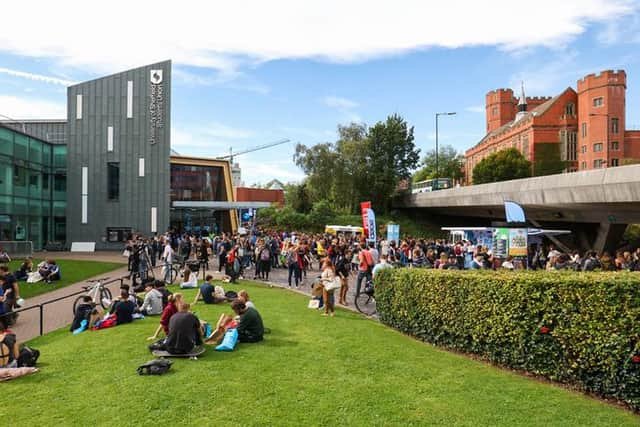Sheffield blazes a trail during pandemic to support community and help healthcare students gain clinical skills
and live on Freeview channel 276
This has meant students from the university’s department of Human Communication Sciences (HCS) have the opportunity to still gain crucial experience in clinical practice, at a time when many speech and language therapy students across the UK had placements cancelled due to coronavirus pandemic, and the implementation of social distancing measures.
These new ways of working remotely with vulnerable people in the community during the pandemic have been so well received, that the university is now seen as a trailblazer in its field. Other universities have approached the school for guidance on how to ensure continuity of clinical contact with patients, whilst safeguarding the chance for students to gain essential clinical skills.


Advertisement
Hide AdAdvertisement
Hide AdSpeech and language therapists are core members of the NHS workforce, and as part of their training, the students undertake a range of clinical placements to prepare them to support people with diverse communication difficulties.
The department runs in-house clinics for clients with dementia, Parkinson’s and aphasia - an acquired communication difficulty sometimes caused by stroke or a traumatic brain injury - all of which can cause a variety of communication problems. Therapists also support children with speech and language difficulties through life transitions, such as navigating the different phases of school life.
At the onset of the pandemic the team moved all of their clinics online, with students providing telehealth care using platforms such as Zoom to mirror the face-to-face and social experience of the groups as closely as possible. They also worked with local community groups to support adults at risk of social isolation due to the pandemic. As people have had to isolate during lockdown, remote therapy has become an increasingly important tool to connect with patients, especially those who live with communication difficulties in their day-to-day lives.
Alongside providing remote care, the students worked with stroke service staff in Rotherham to create much-needed accessible information for people with aphasia to draw upon during the pandemic, and worked with NHS therapists in Sheffield to create shared placement opportunities using teletherapy for the patients that need it most.
Advertisement
Hide AdAdvertisement
Hide AdSteph Illingworth, a second year Master's student at the University of Sheffield who has been helping to run online sessions for the HCS Sheffield Aphasia Group, said: “This placement has allowed aphasia group members to see each other online. It has been wonderful to see people reunited again, especially as the lockdown has been particularly challenging for many. The placement has also encouraged group members to use online resources that can often be daunting for first-time users.
“I was very excited when I received this clinical placement. Although the format of placements has dramatically changed, I have been relieved to gain so much insightful experience working with individuals with aphasia.”
Angelica Mouttet, also a second year Master’s student at the University of Sheffield, added: “It’s been very rewarding knowing that we are creating a social space for people with aphasia who have been isolated throughout this pandemic.”
These new remote services are set to become a key form of healthcare in coming years and Sheffield graduates will be instrumental in sharing the new skills they have gained with future employers.
Advertisement
Hide AdAdvertisement
Hide AdDr Judy Clegg, Head of Department at the University’s Human Communication Sciences department, said: “Making use of our excellent relationship with local service providers and voluntary organisations, we have ensured that our students can continue to help patients receive an excellent level of care during the pandemic.
“The University is looking to emerge stronger from the coronavirus pandemic in terms of the placement opportunities it can offer students, and the whole experience has made the department for HCS more flexible and adaptable whilst ensuring that the high-quality of educational experience students expect here at Sheffield is not sacrificed.
“We’re very delighted with what we’ve achieved in such a short space of time and have some great feedback from clients and students. Students have been great in coming up with new ideas to ensure vital health services continue to run at this time.”
FROM THE EDITOR
Thank you to all who support local journalism with a digital or print subscription to The Star. The events of 2020 mean trusted, local journalism is more reliant than ever on your support. We couldn't do it without you. Subscribe here www.thestar.co.uk/subscriptions so we can keep campaigning on your behalf. Stay safe.
Comment Guidelines
National World encourages reader discussion on our stories. User feedback, insights and back-and-forth exchanges add a rich layer of context to reporting. Please review our Community Guidelines before commenting.